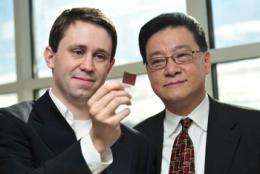Researchers at UA developing next-gen conductive polymers

(�鶹��ԺOrg.com) -- Conductive polymers, while not quite wonder materials, have the potential for being so and University of Akron polymer scientists and polymer engineers are focused on developing the next generation of the material, says Dr. Stephen Z.D. Cheng, dean of the UA College of Polymer Science and Polymer Engineering.
Cheng says that polymers designed to conduct electricity show great promise, but have not completely matured as a technology.
“A lot of R&D is still being carried out on the topic worldwide,” says Cheng, noting that current research is directed at developing the materials for specific applications.
Medical applications to rechargeable batteries
The overall range of potential applications for conductive polymers is expansive, according to Cheng, pointing to electrostatic materials, conducting adhesives, electromagnetic shielding, artificial nerves, antistatic clothing, piezoelectrics and active electronics, which utilize conductive polymers. Likewise, electrical displays, chemical/thermal/biochemical sensors, rechargeable batteries, solid electrolytes, actuators, switches and the like use conductive polymers for their electroactivity.
“Expectations for conductive polymers have not yet been met because of their limited conductivity and stability, which do not satisfy the demanding performance and lifetimes required for many devices. At The University of Akron, we are working to change that,” Cheng says.
Cheng and fellow UA polymer researchers are concentrating much of their work on developing high-performance, stable conducting polymers for solar cell and bio-related applications.
“The conductivities of the polymers are significantly lower than their inorganic counterparts. This can be improved by reducing defects in the current carrying polymer chains. Also, conducting polymers that are intrinsically conductive do not yet exist,” Cheng explains. “New materials under development are addressing these concerns. At the same time, we are focusing on cost-efficient methods to produce.”
Provided by University of Akron
















